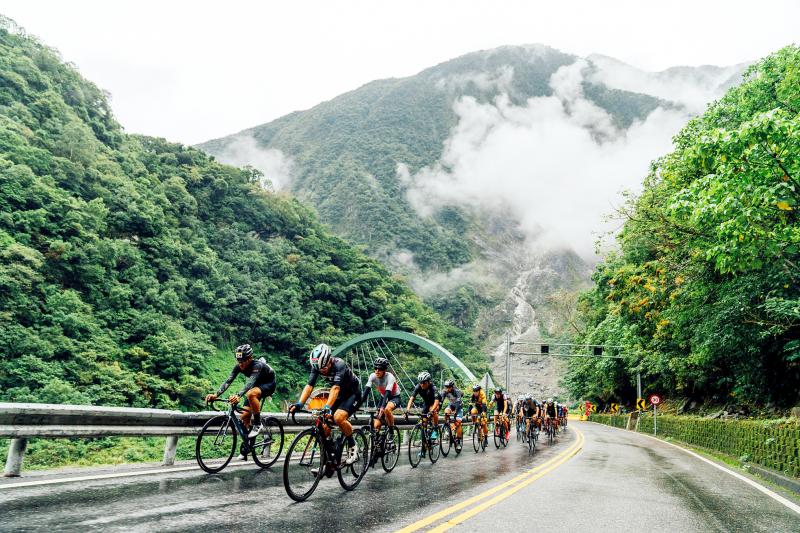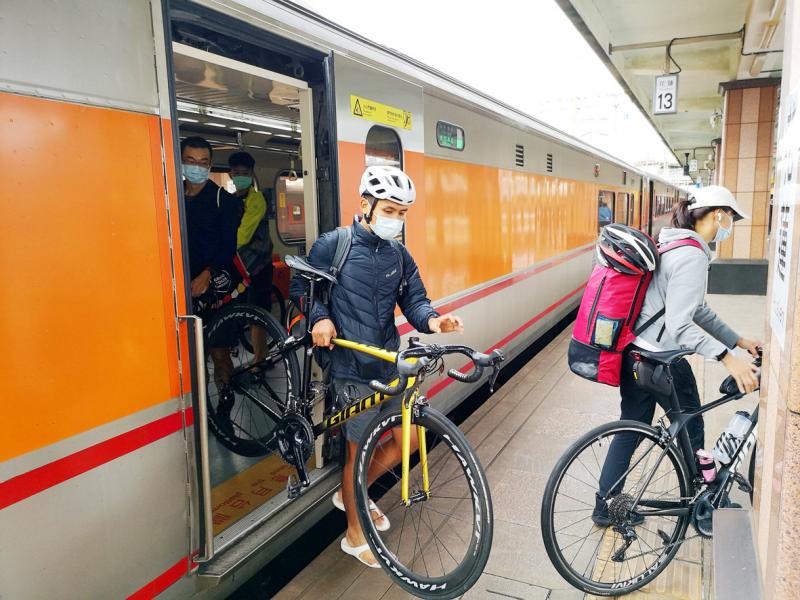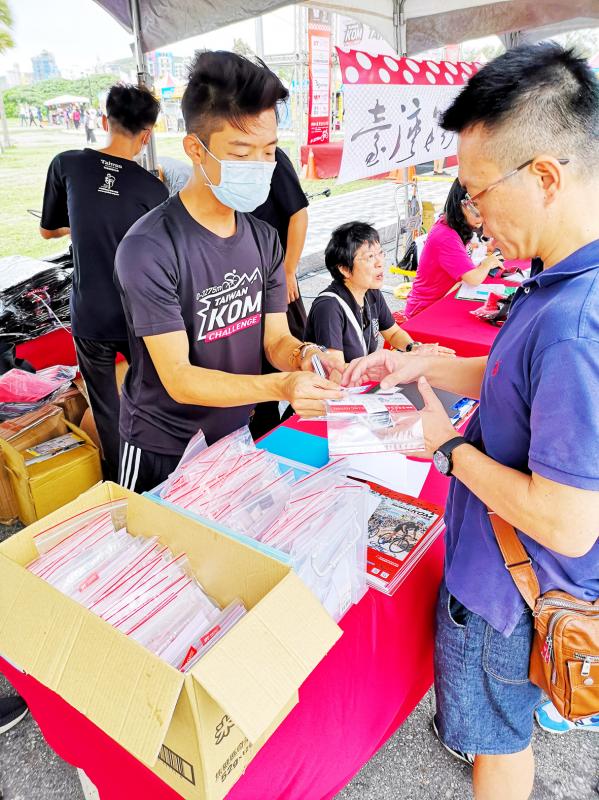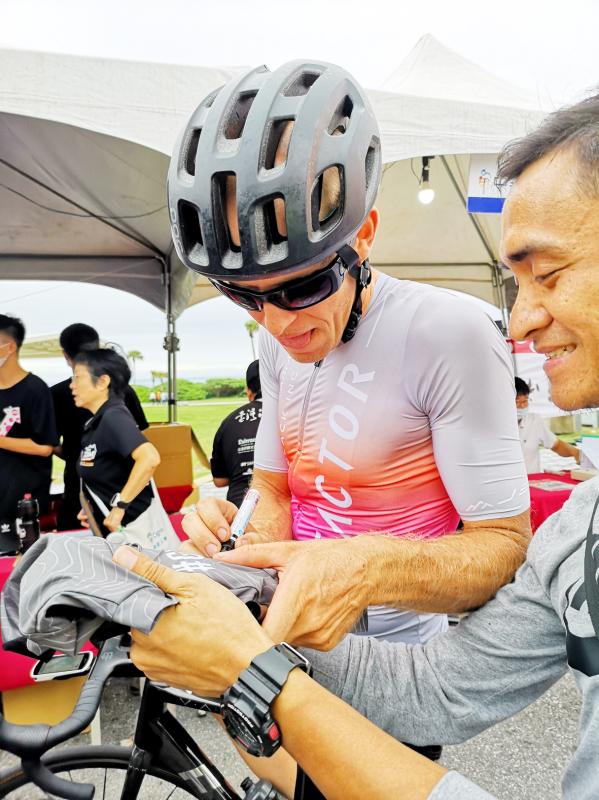“Stay with the peloton if you can, but don’t go beyond zone 3,” John Ebsen told me in an online interview a week before last week’s King of Mountains (KOM) event. Ebsen is a Danish former professional cyclist and three-time winner of Taiwan’s toughest race, so is probably worth listening to.
KOM climbs from the Cisingtan (七星潭) shoreline at Hualien on the east coast to Taiwan’s highest paved road, the Wuling (武嶺) Pass, 105km away and 3,275m uphill in the Central Mountain Range. After winning the 2017 KOM, former Tour de France winner Vincenzo Nibali described it as the longest and hardest climb of his entire life.
For amateur riders like myself, “staying with the peloton” is not even on the wishlist; making the cut-off times at 79km and 95km and thus avoiding the ignominy of being forced into the “broom wagon” is the best we can hope for, even though this would avoid the savage last 10km where gradients can reach a daunting 22 percent if tourists’ cars make zigzagging back and forth across the road impossible.

Photo courtesy of Taiwan Cyclist Federation
“Don’t pay too much attention to your power meter in this race, it will vary too much,” Ebsen continued. Which is just as well, as I don’t have one. Power meter pedals and cranks start at around NT$25,000, about the same as my entire bike cost. Instead, he advocates using a heart rate monitor to make sure you stay in zone 3, “even if you feel you can go harder.”
Zone 3, according to cycling Web sites, is the maximum pace you can sustain for several hours without going into the red. For me this is about 160 to 165 beats per minute.
If you go over that for even one or two minutes, you will blow, Ebsen explains, and it will take you 20 to 30 minutes to recover. “You’ll have a much more enjoyable time if you stay just underneath that.”

Photo: Mark Caltonhill
FALLING IN LOVE
The KOM had a significant impact on the course of his life, Ebsen said. He hadn’t been to Taiwan prior to winning the 2012 event (a year I missed the first cut by 7 minutes), and certainly wasn’t aware of the beauty of the high mountains and the attraction of the island to cyclists.
Celebrating his victory in a local cafe, he met, fell in love with and subsequently married one of its staff members. This led to him making Taiwan his home, put him in an ideal position to win again in 2014 and 2018, and, after hanging up his pro cleats, to his working as global sales manager for Factor Bikes based out of Taichung. Headed up by former professional cyclist Rob Gitelis, Factor Bikes are used by Israel Start-up Nation in the Tour de France.

Photo: Mark Caltonhill
After finishing 8th in last year’s KOM, Ebsen declared he would never ride the race again. Yet he’s back, and has the honor of wearing No.1 again this year.
“I just want to prove to myself that I’m not getting old,” the 31-year-old says. He had planned to race overseas, in the Dirty Kanza, the world’s premier gravel event, for one, and some races in Europe, but the coronavirus pandemic put paid to those plans.
And, although Ebsen doesn’t say so, COVID-19 also means that international competitors should be fewer. It must have occurred to him; it certainly had to me: cut off times have been relaxed so I should be able to avoid the broom wagon and, without the usual plethora of Japanese, Philippinos, Australians and Europeans, I might even squeeze a top-ten age-group finish.

Photo: Mark Caltonhill
A BEAST OF A DAY
It starts to spit rain as we assemble at the start line, fill our water bottles, pump our tires, and hand in our dry clothes for transportation to the top. Everyone seems pretty relaxed despite knowing the challenge awaiting us, invisible in the low clouds that hug the mountains. A lot of this is due to the efficient organization by the Taiwan Cyclist Federation, for whom this is the blue riband event of their year-long calendar of races.
At 6 o’clock exactly the gun sounds and we’re off. I bury myself in the peloton to avoid draining energy fighting the headwind. I should point out that the first 18km to Sincheng (新城) are ridden under supervision, racing is not allowed, and everybody trundles along at a sedate 30kph or so.
Forty-five minutes later we cross the Liwu River (立霧溪), ascend the first incline, turn left into Taroko Gorge, and all hell breaks loose as the race proper begins. Goodness knows how Ebsen and the peloton are getting on; I’m in a small group behind a bigger group somewhere among the also-rans.
The rain is getting worse, but I’m in good company, working together to reign in the 200m between us and the bunch ahead. My heart rate is a comfortable 165 or so. Then suddenly I’m on my own, exposed to the elements and unable to gain protection by drafting. I have to decide: wait for a posse of riders to re-coalesce, or attempt to bridge the gap alone.
I opt for the latter, lower my head and try to power across. One hundred meters ... 50m ... but my heart is struggling. I glance at my monitor, 178bpm, exactly what Ebsen said not to do. But I’m so close. I get to within 30m of the group of 20 or more riders, but cannot sustain the effort and have to drop back and recover.
I have more than 70km left, the weather deteriorating, the temperature dropping as riders appear from the mist and pass me. My heart rate steadily drops: 155 … 150 … 145 … and under 140 when I finally cross the finish line and join fellow competitors huddling under scant cover, slurping soup and donning warm clothes.
There is no sign of Ebsen who finished two hours earlier. Rumor circulates that, despite the conditions and his ‘advanced years,’ he has set a new personal best time and may even have beaten Nibali’s course record.
It turns out he missed it by a couple of minutes, but the NT$100,000 prize money for his fourth victory probably eases the sting.
Mark Caltonhill bikes, and writes, and writes about bikes.

The unexpected collapse of the recall campaigns is being viewed through many lenses, most of them skewed and self-absorbed. The international media unsurprisingly focuses on what they perceive as the message that Taiwanese voters were sending in the failure of the mass recall, especially to China, the US and to friendly Western nations. This made some sense prior to early last month. One of the main arguments used by recall campaigners for recalling Chinese Nationalist Party (KMT) lawmakers was that they were too pro-China, and by extension not to be trusted with defending the nation. Also by extension, that argument could be

Aug. 4 to Aug. 10 When Coca-Cola finally pushed its way into Taiwan’s market in 1968, it allegedly vowed to wipe out its major domestic rival Hey Song within five years. But Hey Song, which began as a manual operation in a family cow shed in 1925, had proven its resilience, surviving numerous setbacks — including the loss of autonomy and nearly all its assets due to the Japanese colonial government’s wartime economic policy. By the 1960s, Hey Song had risen to the top of Taiwan’s beverage industry. This success was driven not only by president Chang Wen-chi’s

Last week, on the heels of the recall election that turned out so badly for Taiwan, came the news that US President Donald Trump had blocked the transit of President William Lai (賴清德) through the US on his way to Latin America. A few days later the international media reported that in June a scheduled visit by Minister of National Defense Wellington Koo (顧立雄) for high level meetings was canceled by the US after China’s President Xi Jinping (習近平) asked Trump to curb US engagement with Taiwan during a June phone call. The cancellation of Lai’s transit was a gaudy

The centuries-old fiery Chinese spirit baijiu (白酒), long associated with business dinners, is being reshaped to appeal to younger generations as its makers adapt to changing times. Mostly distilled from sorghum, the clear but pungent liquor contains as much as 60 percent alcohol. It’s the usual choice for toasts of gan bei (乾杯), the Chinese expression for bottoms up, and raucous drinking games. “If you like to drink spirits and you’ve never had baijiu, it’s kind of like eating noodles but you’ve never had spaghetti,” said Jim Boyce, a Canadian writer and wine expert who founded World Baijiu Day a decade